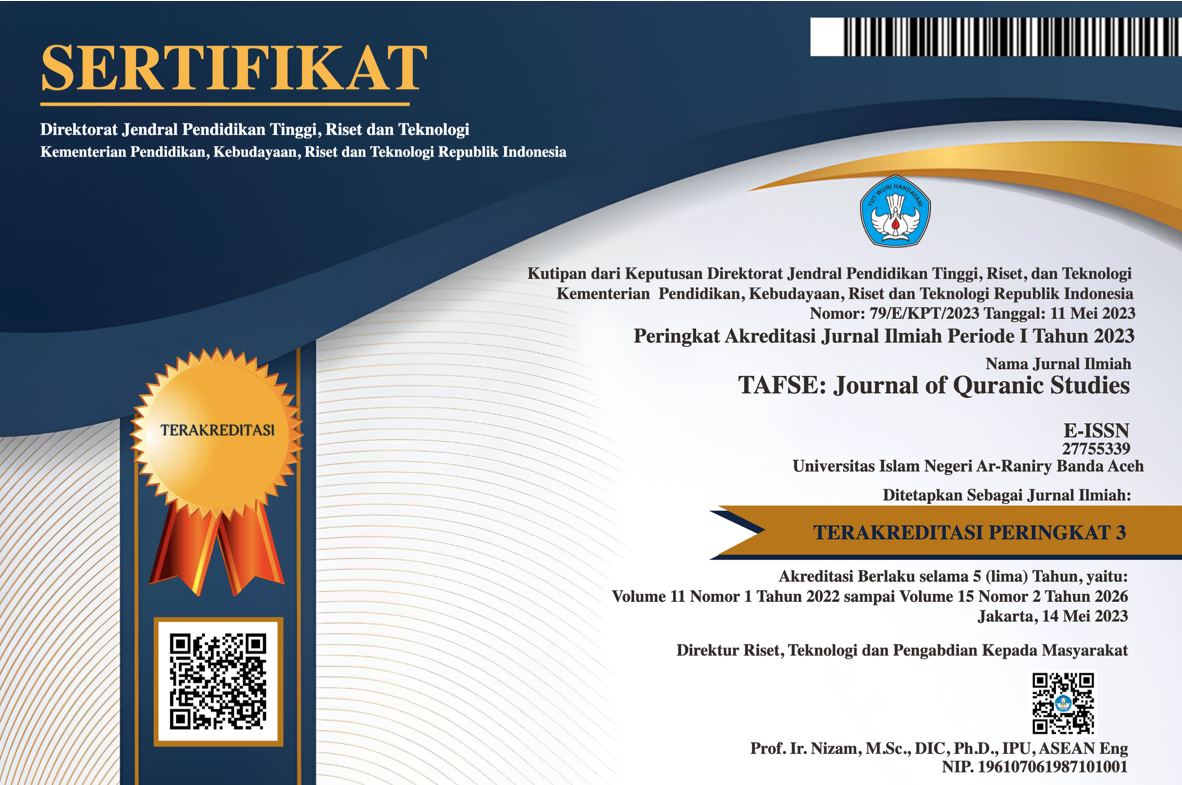Ragam Ungkapan Damai dalam Al-Qur’an
DOI:
https://doi.org/10.22373/tafse.v2i1.8077Keywords:
Ungkapan, Damai, Al-Qur’anAbstract
Islam has come as a religion that carries a mission of peace and strictly forbids mankind to do tyranny. As social beings, humans must follow certain provisions and regulations if they live and are in the midst of society. The word "peace" in the Qur'an is mentioned in various expressions and styles of language and different editorials according to their respective contexts. Thus, the expression has a different impact. In this paper, the author will discuss the various expressions of peace in the Qur'an and the different meanings of these expressions and their wisdom. From the results of this search, the authors found that in the Qur'an there are five kinds of expressions in the meaningful mention of the word "peace" namely aman, janahu, dzimmah, salam, and shulhu. Peace is salvation for the welfare of individuals, communities and even the entire human race.
Islam datang sebagai agama yang membawa misi perdamaian dan dengan tegas mengharamkan umat manusia untuk melakukan keẓaliman. Sebagai makhluk sosial, manusia harus mengikuti ketentuan-ketentuan serta peraturan-peraturan tertentu apabila ia hidup dan berada di tengah-tengah masyarakat. Kata “damai” dalam al-Qur’an disebutkan dengan beragam ungkapan dan gaya bahasa serta redaksi yang berbeda sesuai dengan konteksnya masing-masing. Sehingga, ungkapan tersebut mengandung dampak yang berbeda pula. Dalam tulisan ini, penulis akan membahas tentang ragam ungkapan damai dalam al-Qur’an dan perbedaan pengertian dari ungkapan-ungkapan tersebut serta hikmahnya. Hasil dari penelusuran ini, penulis menemukan dalam al-Qur’an ada lima macam ungkapan dalam penyebutan yang semakna dengan kata “damai” yaitu aman, janahu, dzimmah, salam, dan shulhu. Perdamaian adalah keselamatan untuk mendapatkan kesejahteraan, baik individu, masyarakat bahkan seluruh umat manusia.
Downloads
References
Ibnu Katsir. Tafsir Ibnu Katsir. Terj. M. Abdul Ghoffar. Jakarta: Pustaka Imam Asy-Syafi’i, 2008.
M. Fuad Abd. al-Baqi. Al-Mu’jam al-Mufahras li Alfaz al-Qur’an al-Karim. Beirut: Dar al-Fikr, 1980.
M. Idris Abdulrauf al-Marbawi. Kamus Idris al-Marbawi Arab-Melayu. Jakarta: Darul Ihya’ al-Kitabu al-Arabiyah, t.th.
M. Quraish Shihab. Tafsir al-Mishbah; Pesan, Kesan dan Keserasian al-Qur’an. Jakarta: Lentera Hati, 2002.
Ridwan Nurdin. 2010. Fiqh Muamalah: Sejarah Hukum dan Perkembangannya. Aceh: PeNA, t.th.
Sa’ad Abu Habib. Perspektif Ulama dalam Hukum Islam. Jakarta: Pustaka Firdaus, 1987.
Sayyid Qutb. Tafsir fi Zhilal al-Qur’an. Ter. As’ad Yasin, dkk. Jakarta: Gama Insani Press, 2003.
Sayyid Sabiq. Fiqh Sunnah. Terj. Abu Syaugina dan Abu Aulia Rahma. Jakarta: Tinta Abadi Gemilang, 2013.
Wahbah al-Zuhaili. Fiqih Imam Syafi’i. Terj. Muhammad Afifi dan Abdul Hafiz Jakarta: Almahira, 2010.
______. Fiqih Islam wa Adillatuhu. Terj. Abdul Hayyie al-Kattani, dkk. Jakarta: Gema Insani, 2011.
______. Ushul al-Fiqh al-lslami. Damaskus: Dar al-Fikr, 2009.
______. Fiqh & Perundangan Islam. Terj. Ahmad Sh. Jakarta: Dewan Bahasa dan Pustaka, 2001.
Downloads
Published
Issue
Section
License
Authors who publish with this journal agree to the following terms:
- Authors retain copyright and grant the journal right of first publication with the work simultaneously licensed under a Creative Commons Attribution License (CC BY NC 4.0) that allows others to share the work with an acknowledgment of the work's authorship and initial publication in this journal.
- Authors are able to enter into separate, additional contractual arrangements for the non-exclusive distribution of the journal's published version of the work (e.g., post it to an institutional repository or publish it in a book), with an acknowledgment of its initial publication in this journal.
- Authors are permitted and encouraged to post their work online (e.g., in institutional repositories or on their website) prior to and during the submission process, as it can lead to productive exchanges, as well as earlier and greater citation of published work (See The Effect of Open Access).





